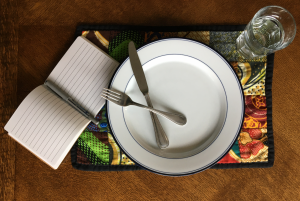Fasting and Prayer: Authority and Connection
Jay+ Wright
 Fasting is a discipline God’s people have taken up for millennia, but it is not so popular in our current day. I’ve been an Anglican clergyman for a decade now, and fasting has been something I’ve been slow to practice. Maybe it’s my inner perfectionist? Or maybe I really love food?
Fasting is a discipline God’s people have taken up for millennia, but it is not so popular in our current day. I’ve been an Anglican clergyman for a decade now, and fasting has been something I’ve been slow to practice. Maybe it’s my inner perfectionist? Or maybe I really love food?
Sure, in Lent it’s easy to fast from social media (don’t we all need this fast more often?), alcohol, TV or something. And those are great things to abstain from. But when we fast from food, things get a little more real. Hunger pains—getting hangry (that delicious combo of hungry and angry), growing impatient and more and more easily perturbed—seem to result on fast days for me.
And it’s at this point of chaos in my belly and felt chaos around me where the opportunity lies. What do I do? Most often, not what I ought—and what I ought to do is pray. When I feel the pain, the frustration, the sense of overwhelming lack of control, I should pray. This is why we fast: We deny our bodies in order to connect more deeply with our living God. We say “no” to something good in order to say “yes” to something far greater: God himself. When we pray in this way, God grants us spiritual authority. (Remember, in Mark 9:29 Jesus told his disciples that certain demons only come out “through prayer and fasting.”)
Not only do we grow in spiritual authority through fasting and prayer, we also deepen our connection to God: Father, Son and Holy Spirit. Recently I was beset by a particular worry that slowly grew to anxiety, which quite turbulently became an outright occupation of my mind. So, in that moment of chaos, I took my little prayer rope that helps me pray, I went outside and I began to focus on my breath. While inhaling and with the rhythm of my heartbeat I prayed, “Lord, Jesus Christ”; and while exhaling I said, “have mercy on me, a sinner.” I beheld the trees around me and, recalling that the cross is the Tree of Life, I began to picture each one as that instrument of death and life, all the while breathing, praying. Soon, the preoccupation of my mind became Christ himself and a calm rest fell over my soul.
The situation I was anxious about didn’t go away. Quite the contrary: It still needed to be dealt with and would require my attention. But in this moment of connection with God and clarity, I could see the situation correctly and could experience the anxiety as part of God’s process of making me holy.
If you’re not accustomed to regular fasting and prayer and don’t often find them a source of spiritual authority and connection, I invite you to take up these disciplines that Jesus teaches us about in the Sermon on the Mount (Matthew 5-7). And as you do so, I pray his Kingdom comes and his will is done in you as it is in heaven.

Jay+ was ordained a priest in the Anglican Mission in 2011 but has served in various ministries over the last 20 years including worship leader and associate pastor at All Saints Dallas from 2011-2015 and then of St. Bartholomew’s Anglican Church, a plant of All Saints Dallas in East Dallas. In 2023 he earned a Master of Arts in Biblical Counseling from Dallas Theological Seminary. Currently Jay is in a private counseling practice with his wife Amy. He holds a Bachelor of Music degree from West Texas A&M University and a Master and Doctorate of Worship Studies from the Webber Institute for Worship Studies. Jay and Amy have four children.










